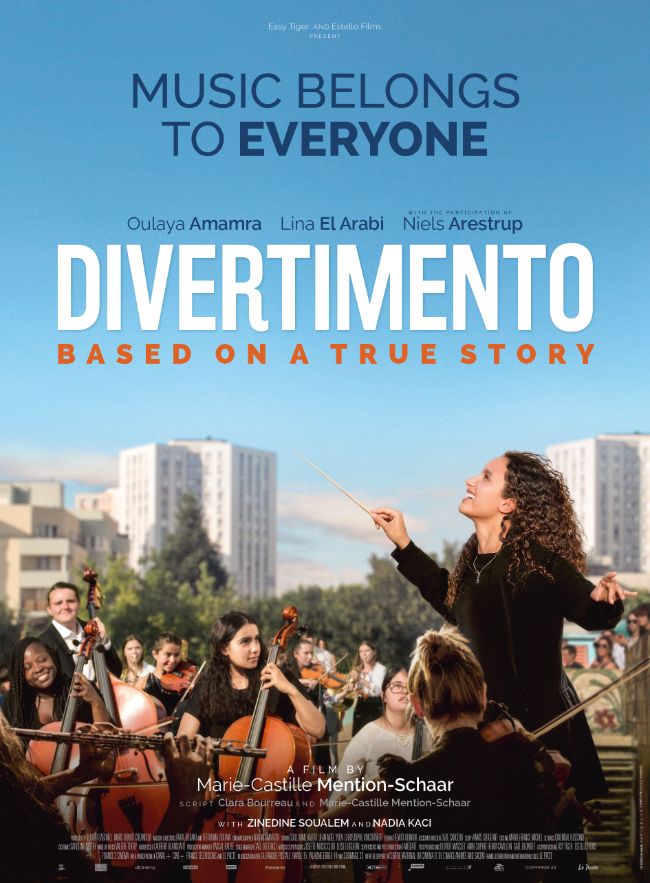Film Review: Divertimento
- SUBSCRIBE
- ALREADY SUBSCRIBED?
BECOME A BONJOUR PARIS MEMBER
Gain full access to our collection of over 5,000 articles and bring the City of Light into your life. Just 60 USD per year.
Find out why you should become a member here.
Sign in
Fill in your credentials below.
Women orchestra conductors are having their moment in the cinema. Tar, the sleekly sophisticated, brilliantly acted (by Cate Blanchett) film about an abusive mentor-mentee relationship, has garnered raves and pans and lots of controversy. A new French film, Divertimento, recounts the apprenticeship of a young woman in this rarefied milieu (based on a true story). Zahia Ziouani (Oulaya Amamra) is still a high-school student, not having yet taken her Baccalauréat exam. Along with her sister Fettouma (Lina El Arabi) and some other students, she also attends a conservatory. Though she plays an instrument, the viola (her sister plays cello) Zahia has her heart set on conducting, a desire which came about when she saw a televised concert with a conductor leading the orchestra in Ravel’s “Bolero”.

Divertimento. Credit: Le Pacte
What gives Divertimento added interest is that Zahia is of North African descent, and lives in the underprivileged northern suburb of Saint-Denis (known by its administrative code “93”). Classical music isn’t much of a thing with typical teenagers from the area. But Zahia and Fettouma’s dad (played by Zinedine Soualem) is a classical music fanatic, whose happiest moment after arriving in France was when he coughed up a considerable sum to see a live concert at the Salle Pleyel, and who continues to listen rapturously to his precious vinyl records. The mother (Nadia Kaci) plays a more traditional role in this loving immigrant family, but in a nice moment we see Zahia entranced, watching her rhythmic gestures while doing housework. It’s in capturing little moments like these that the director, Marie-Castille Mention-Schaar, reveals herself as both a fresh and moving talent.

Cast of Divertimento. Credit: Le Pacte
Zahia and Fettouma are actually twin sisters, but fraternal twins. By coincidence, the day I saw the film I spoke to a woman about her relationship with her fraternal sister: very close, but with pronounced differences (even physical: one blonde, the other brunette). So in the movie, there is powerful synergy between the soulful, strong “older” Zahia and the strikingly sensual Fettouma, strong in her own way. The fraternal relationship is key to both sisters’ musical development. The director’s other major talent is bringing out powerful performances from her leads (and even secondary characters). It’s when she is least obtrusive in setting up their scenes that the flow and clash of characters work best.
Much of the film’s first half deals with not only the collaboration among music students but also the competition between them. In the conservatory there are more students from Paris proper, more of them white, male, and upper-class. Zahia in particular must face the disdain of the competition. This seems a little like, sometimes too much like, an American movie or TV dramedy about up-and-coming good guys (or girls) vs. the snotty baddies — we find ourselves intuitively casting the American remake.

scene from Divertimento. Credit: Le Pacte
Yet it’s true that certain fields in France, a country that generally strives for égalité, can be shockingly unegalitarian to women, minorities and lower social classes. Were Zahia and Fettouma stimulated by the unfair competition? Perhaps. On the other hand, Zahia gets needed support from some of her teachers — Divertimento is to a degree an ode to the French education system, as well as the acculturating role of la République. The film is quite interesting as it depicts the nitty-gritty of municipal work in the suburbs, in this case the town of Stains.
The story is ratcheted up when Zahia joins a class taught by her conductor hero, Sergiu Celibidache, played by Niels Ardestrup. The mentor-mentee relationship is strictly pedagogical here, but still very fraught. Sergiu is one temperamental and demanding septuagenarian. In some films Ardestrup has seemed like a Scandinavian sourpuss (he’s actually French), but here he’s a magnificent old lion, whose feedback comes in the form of growls and the occasional roar. Sergiu teaches Zahia to invest herself more profoundly in her conducting, to transcend the merely technical, but it comes at a scarifying cost.

Scene from Divertimento. Credit: Le Pacte
At one point, Zahia’s father tells her she’s doing too much, and that she has to choose. There’s still her pending Baccalauréat exam, the conservatory, lessons with Sergui, and the pet project that gives the film its name. She and her sister want to create an orchestra for young people, to be housed in the municipal cultural center, in order to inculcate a convivial, family-like atmosphere into classical music. The group will be called Divertimento. This is laudable (and in real life came to fruition and still exists) but the father has a legitimate point. Sometimes Zahia seems to be doing too much and her personal life suffers — Fettouma at least finds a boyfriend in the course of the film, while Zahia is limited to musical comrades.
In the same way, we feel the director is also doing too much. The film’s narrative goes in many directions — the American-style dramedy, family portrait, apprenticeship story, and the Fame-like let’s-put-on-a-show orchestra story. Zahia is also preparing for a musical competition in Poland. What tips the film into too much is a sub-plot about the young people helping little children learn about the edifying benefits of music, and another sub-plot about performing at a prison (a boy Zahia gives lessons to is the son of a convict). Divertimento risks becoming an uplifting confection, losing some of its depth.

Divertimento poster. Credit: Le Pacte
And there is depth in Divertimento. We observe how the young woman conductor has to harden herself against male repression; how total immersion in the music world results in relationships subsumed within that world; how the role of conductor is inherently authoritarian. The English word conductor could also apply to a ticket-puncher on a train, and the French conducteur might be a truck driver. But in France the conductor is referred to as the chef (or cheffe) d’orchestre. Without knowing anything about the real-life model for Zahia, who I assume is beyond reproach, we wonder if the fictional character may not be just the un-Tar, but perhaps a pre-Tar.
Production: Easy Tiger/Estello Films
Distribution: Le Pacte
Lead photo credit : Divertimento poster. Credit: Le Pacte
More in cinema, Divertimento, film review, french cinema, music




